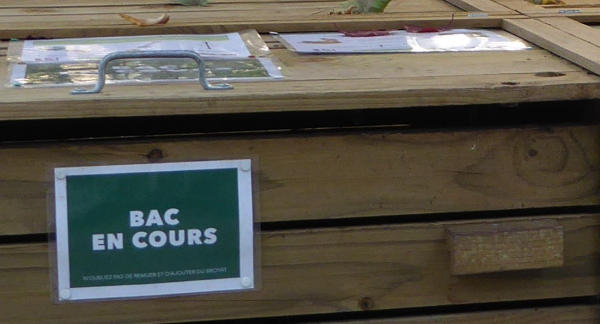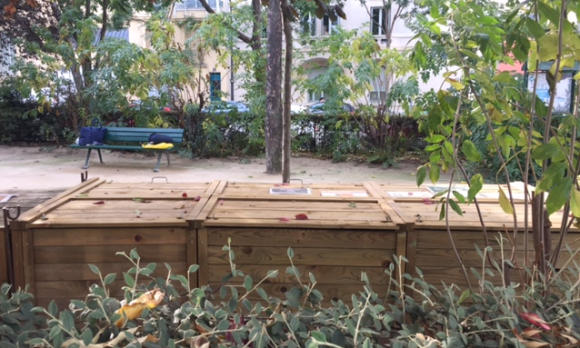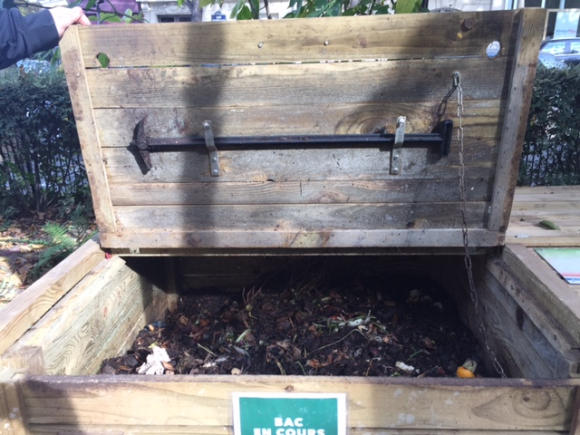
By Niamh Tixier
When I was growing up we had no rubbish-bin collection. Waste papers were burned, leftover food was transformed and re-served, empty bottles were a bit of a problem but almost everything else ended its life rotting on the compost heap at the bottom of our garden. We used the compost as fertilizer and used the worms from the compost as bait for fishing.
But in a Parisian apartment composting is impossible, so my raw fruit and vegetable peels just have to go in the bin.
But one day this summer, as I was walking through the park near my home, I noticed three large wooden boxes or chests. They’d obviously been put there recently, I could get that tarry smell of new wood coated with preservative. The hinges on the lids were shiny and new-looking too. Intrigued, I looked closer and saw that each chest was clearly labelled, the first one said “Currently in use,” number two said “For future use” and the last one, “Dry matter.” An explanation was provided in the form of a notice telling the world that this was to be the site of a project called “Organic Composting” giving the name of the park, and an email address for those who needed further information.
I sent off an email asking for information and, more importantly, if I could throw my organic waste in the “Organic Compost.” My request was answered immediately with an invitation to a meeting the following Saturday morning at eleven, in the park.
Saturday morning at eleven there was only me standing beside the three wooden compost chests, then two or three stragglers with cans of beer. Five minutes later a couple arrived, settled on a bench and started what looked like a serious discussion. After about twenty minutes other people started to arrive and to gather around the three wooden chests, mostly young couples with babies in strollers. We looked at each other, wondering if one of us might be the person who sent the invitation.
Finally, a young woman arrived, tall and with such an air of natural self-possession and authority that it was clear that she was the one, our leader, our lovely Compost Queen. She addressed the waiting crowd, about ten of us by now, the stragglers and the couple on the bench having understood this wasn’t for them. Certain things had to be made clear, she explained, the first being that this was a meeting of the Square L. compost and if you happened to come from another neighborhood, she mentioned another one, a single metro station away, then you had to use their compost.
The imposters slunk away.
She went on to explain that it was a participative compost project, that we’d all have to take turns manning it one Saturday a month and that we should put our names down now if we wanted to take part.
“But, there is a waiting list,” she said, “and places are limited.”
My heart sank as I imagined having to sit an exam, a sort of French concours, but before I could object there were mumblings from the other candidates too and so she assured us that those of us who were present would all be admitted. We smiled at each other, relieved to know that our tea bags and coffee dregs would be welcomed and could rot away comfortably.
She explained too that we mustn’t presume that it was easy, you don’t simply dump your organic waste into it, you have to stir it all up with a large wand-like instrument provided and held in the lid, and then you add some of the “dry matter” from wooden chest number three to soak up the liquefied rot. To give a demonstration of this the Compost Queen opened up the lid of the chest currently in use. We all leapt back and waited until the swarms of flies suddenly released had escaped, and then had a good look at what had already been put into the chest and was composting.
“Not good,” she said. “Look at those onions. Worms don’t like onions. And you should break up your eggshells before putting them in, you can’t expect the worms to climb over them. No citrus fruits, no shop-bought flowers, they are all bad for the worms.”
She then delicately picked out the few onions and the cut flowers visible on the top of the pile and threw them in the nearby waste-bin.
“What about newspapers?” someone dared ask.
“Yes, they’re allowed, but not if they come from your grandmother’s attic, the ink will have lead in it,” came the answer.
There were other questions and gradually the company relaxed a bit as we exchanged composting stories and experiences. One woman told me about how she had spent a year in London as an au-pair and that was when she discovered compost-heaps. She told me that when an English person shows you around their house, they will proudly take you to visit their compost-heap too. After a brief word about what compost duty entailed, we were each given a green bucket, the meeting broke up and we all went home.
I put myself down for compost duty a month or two later, picking the only date that wasn’t already taken. I was there at ten o’clock, it was lashing rain, not another soul in sight. I opened the compost chest marked “in current use.” Nothing alarming seemed to be happening so I closed it again. After a few minutes our beautiful Compost Queen came. We chatted. She told me about the work that running the compost group involved. She had volunteered to Paris City Hall when they were looking for people interested in starting one in their neighborhood and they gave her a one-day course in composting and planting. So I asked her where and when our compost would be used for planting. She lowered her eyelids as she told me with great sadness that in Paris City Hall, compost comes under “waste” and planting comes under “green spaces,” and “green spaces” doesn’t speak to “waste.”
We pondered this one for a minute or two under our umbrellas. Then we decided just to keep on composting and said goodbye.
Text and photos © 2017, Niamh Tixier
Niamh Tixier is Irish and has been living in Paris for several years.



